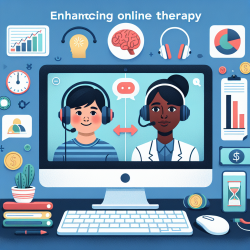Understanding the Link Between Cyberbullying and Gambling Disorder
As a Special Education Director, it is crucial to stay informed about the latest research and trends affecting students. One such area of interest is the intersection of cyberbullying and gambling disorder, particularly how they relate to emotion regulation and coping strategies. A recent study titled "Cyberbullying and Gambling Disorder: Associations with Emotion Regulation and Coping Strategies" provides valuable insights that can enhance practitioner skills in addressing these issues.
Key Findings from the Research
The study explores the prevalence of cyberbullying among adolescents and young adults with gambling disorder (GD) and a community sample. It highlights the association between cyberbullying victimization and higher emotion dysregulation, as well as the use of maladaptive coping styles. These findings suggest that individuals exposed to cyberbullying may struggle with regulating their emotions and employ ineffective coping mechanisms.
Moreover, the research indicates that cyberbullying severity is linked to inadequate coping strategies and emotion regulation difficulties. In both clinical and community samples, higher cyberbullying severity correlated with the use of maladaptive coping styles, such as rumination and catastrophizing. These insights emphasize the importance of addressing emotion regulation and coping strategies in interventions for cyberbullying and gambling disorder.
Implications for Practitioners
Practitioners working with students who experience cyberbullying or have gambling disorders can benefit from incorporating the study's findings into their practice. Here are some actionable steps to consider:
- Promote Emotional Awareness: Encourage students to recognize and articulate their emotions, which can help them develop healthier coping mechanisms.
- Teach Adaptive Coping Strategies: Introduce techniques such as problem-solving, cognitive restructuring, and seeking social support to help students manage stress and emotional challenges.
- Implement Prevention Programs: Develop and integrate programs that focus on building emotional intelligence and resilience in students, reducing the risk of cyberbullying and gambling-related issues.
- Collaborate with Online Therapy Providers: Utilize online therapy services, like those offered by TinyEYE, to provide accessible support for students struggling with these issues.
Encouraging Further Research
While the study provides valuable insights, it also highlights the need for further research into the relationship between cyberbullying, gambling disorder, and underlying psychological mechanisms. Practitioners are encouraged to stay informed about new developments in this field and consider participating in research initiatives to contribute to a deeper understanding of these complex issues.
To read the original research paper, please follow this link: Cyberbullying and Gambling Disorder: Associations with Emotion Regulation and Coping Strategies.










